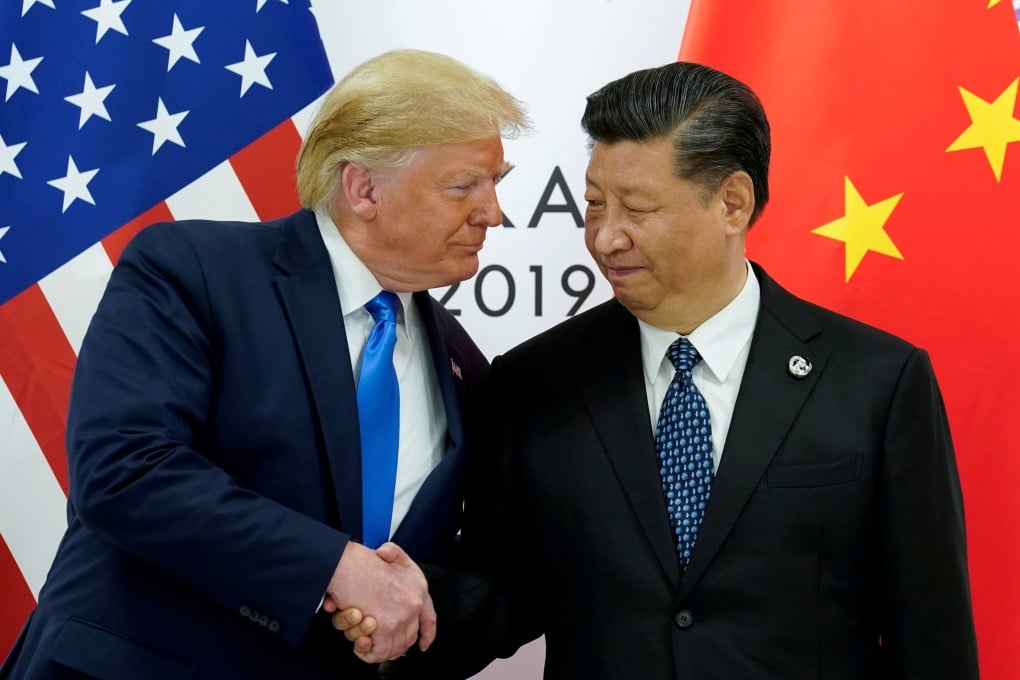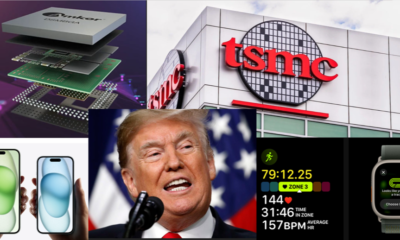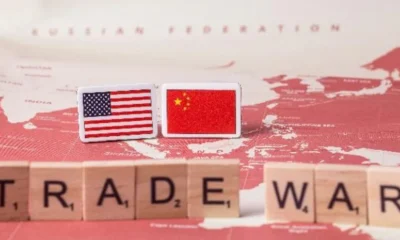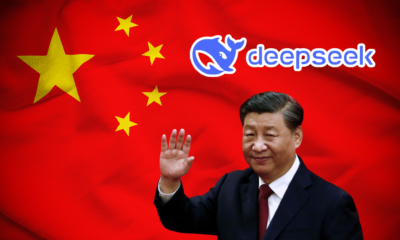Politics
Trumps Big Invite To China’s Xi Jinping To His Inauguration. Consolidation Of Powers Or Diplomatic Theater At Best, But Could It Work?
United States President-elect Donald Trump has invited his Chinese counterpart Xi Jinping to attend his inauguration ceremony in January.
Published
1 year agoon

The big surprise despite the history of hawkish rhetoric and tariff threats, United States President-elect Donald Trump has invited his Chinese counterpart Xi Jinping to attend his inauguration ceremony in January. Trump also been asking other world leaders if they want to come to the inauguration — in a break with convention.
Breaking Convention with a Bold Move
Trump’s move to invite Xi Jinping, along with other world leaders, is far from the norm. Typically, U.S. presidential inaugurations are domestic affairs, with foreign leaders sending congratulatory messages rather than showing up in person. But then again, Trump has never been one for sticking to tradition.
Karoline Leavitt, Trump’s incoming press secretary, framed the invitation as an effort to foster dialogue with both allies and adversaries. “This is an example of President Trump creating an open dialogue with leaders of countries that are not just our allies but our adversaries and competitors too,” she said during an appearance.
In true Trump style, he’s doubling down on his “dealmaker” persona, treating foreign policy like a business negotiation—complete with carrots, sticks, and maybe even a few surprises.
Reactions Pour In
As expected, the reactions to this unconventional invite have been mixed. Experts in diplomacy and history have weighed in, and let’s just say they’re not holding back — it would be unprecedented for a Chinese leader to attend a U.S. presidential inauguration.
And probably right. When asked about the invitation, Chinese Foreign Ministry spokesperson Mao Ning played it cool, saying, “I have nothing to share at present.” Translation: don’t hold your breath.
Symbolism or Savvy?
Historians are divided on what this invitation really means. Jim Bendat, author of Democracy’s Big Day, noted that it’s unusual but not inherently problematic to invite foreign leaders to an inauguration. However, he added, “It sure would make more sense to invite an ally before an adversary.”
Meanwhile, Edward Frantz from the University of Indianapolis suggested that this move plays right into Trump’s brand as a savvy businessman who’s not afraid to shake things up. Whether or not Xi accepts the invitation, the mere act of extending it reinforces Trump’s image as a dealmaker who thinks outside the box.
Interestingly, Trump’s inauguration is set to take place just a day after the U.S. deadline for ByteDance—TikTok’s Chinese parent company—to sell its U.S. operations or face a ban.
Trump 1.0 Was A Rocky Relationship with Xi Jinping
Let’s not forget the history here. During Trump’s first term, from 2017 to 2021, he initiated a trade war with China that led to both countries slapping tariffs on each other’s imports.
The United Nations Trade and Development Organization even warned in 2019 that this trade war was economically hurting both nations. And guess who bore the brunt of those tariffs? consumers.
Looking ahead, a second Trump term might not exactly be a picnic for U.S.-China relations. Trump has already pledged to impose an additional 10% tariff on Chinese goods if China doesn’t curb the trade of synthetic fentanyl.
And with foreign policy hawks like Marco Rubio in his corner, the tough talk is unlikely to dial down. For context, China sanctioned Rubio in 2020, accusing him of “predatory tactics” aimed at weakening its economy.
Signs of Cooperation Amidst the Drama?
Interestingly, while Trump is making waves with his invitation, the current Biden administration has also shown some signs of wanting to improve ties with China. This week, senior Treasury Department officials announced plans to visit Nanjing, China, and engage with Chinese counterparts at a G20 meeting in South Africa. It’s a glimmer of hope that dialogue isn’t completely off the table.
Trump himself has hinted at a willingness to warm relations, saying, “We have a good relationship with China. I have a surprising relationship. Now, when the COVID came in, I sort of cut it off. That was a step too far.”
Even Xi Jinping has called for collaboration, emphasizing the importance of “win-win cooperation over zero-sum games” in a letter read aloud at a U.S.-China Business Council gala.
But could it work?
Trump’s invitation to Xi Jinping is emblematic of his penchant for grand gestures in foreign policy, often disregarding traditional diplomatic norms in favor of unpredictability.
It shows Trump’s belief that his personal charisma and force of personality can drive diplomatic breakthroughs. Yet, history suggests such an approach rarely succeeds, especially with adversaries like China, which base decisions on calculated national interests rather than personal rapport.
The timing of the invitation is particularly intriguing, given Trump’s hawkish foreign policy team. His picks include Florida Senator Marco Rubio as Secretary of State and Florida Representative Mike Waltz as National Security Adviser—both of whom view China as a multi-dimensional threat to the United States, spanning economic competition, maritime dominance, and even outer space.
Trump’s overture to Xi comes amid mounting expectations that U.S.-China relations will grow even more contentious under his administration. Building on the Biden administration’s firm stance and Trump’s own first-term policies, the incoming team seems set to adopt an even tougher approach.
The two nations remain at loggerheads over critical issues, including Taiwan—a democratic island that China claims as its territory and which the U.S. may or may not defend against invasion.
China’s deepening ties with other U.S. adversaries, such as Russia, North Korea, and Iran, form an informal anti-Western axis, while tensions in the South and East China Seas frequently bring military forces of the two powers dangerously close to conflict.
Meanwhile, bipartisan U.S. lawmakers accuse China of economic espionage, military theft, and disregard for international laws and trade norms.
Against this backdrop, Trump’s simultaneous threat of “crushing tariffs” on China and invitation to Xi seems like a glaring contradiction.
Trump’s First Big Move in China Relations
Now here is something about Trump, while critics often denounce Trump’s unpredictability, his spontaneous maneuvers can destabilize rivals and create unexpected opportunities for the U.S. For instance, if Trump can make headway in distancing Xi Jinping from alliances with Russia and North Korea, it would be a significant diplomatic victory—despite ongoing disputes with China.
Yet, Trump’s first-term foreign policy raises questions about whether his dramatic strategies produce lasting outcomes.
His approach to China remains especially perplexing. On one hand, Trump sees Beijing’s mercantilist policies as a direct threat to the U.S., accusing China of exploiting America for decades.
On the other, he frequently touts his friendship with Xi, describing him as “tough and smart.” Trump appears to believe their personal rapport could influence Xi’s view of him—a dubious assumption given Xi’s track record of pragmatic decision-making.
This contradiction was evident during Trump’s recent interview “We’ve been talking and discussing with President Xi, some things and others, other world leaders, and I think we’re going to do very well all around,” Trump said. Yet in the same breath, he added, “We’ve been abused as a country. We’ve been badly abused from an economic standpoint.”
This contrarian streak may also explain Trump’s olive branch to Xi. It’s possible Trump envisions a new trade deal, despite the lackluster results of his Phase One trade agreement in 2019. Although he hailed the deal as “historic,” its promises of structural economic reform and massive Chinese purchases of U.S. goods never materialized. The pandemic further soured relations, and there’s no indication Xi intends to fulfill those earlier commitments.
Trump’s tariff strategy also remains a puzzle. While he insists tariffs hurt Beijing financially, they’ve raised prices for U.S. consumers—a politically risky move that could alienate his voter base. Thus, the central question is whether Trump views tariffs as leverage for negotiation or as tools for decoupling the U.S. and Chinese economies.
Beijing appears to be taking Trump seriously. In the weeks since his election, China has prepared retaliatory measures, including launching an anti-trust investigation into U.S.-based chipmaker Nvidia, restricting exports of rare minerals critical to American tech industries, and loosening monetary policy to shield its economy from potential trade tensions.

The Verdict
So, will this invitation actually achieve anything meaningful? Probably not.
Experts like Danny Russel from the Asia Society Policy Institute argue that even if Xi did show up—an unlikely scenario—it would send a deeply fraught message. “Can you imagine Xi Jinping sitting outdoors in Washington, D.C., in January at the feet of the podium, surrounded by hawkish members of Congress, gazing up at Donald Trump as he delivers his inaugural address?” Russel asked. Yeah, neither can we.
But maybe that’s not the point. For Trump, the act of inviting Xi might be enough to set the tone for his administration’s approach to China—a mix of unpredictability, bold gestures, and high-stakes negotiation.
Whether it’s consolidation of powers or just diplomatic theater, Trump’s inauguration is shaping up to be anything but ordinary.

You may like
-


Taiwan’s ‘Historic’ TSMC Deal, A Win Or The End Of Its ‘Silicon Shield’ As China Threatens? A Jittery Taiwan Watches Trump’s Moves On Ukraine, Wondering, Could We Be Next?
-


A Trade War That Just Won’t Quit. As Trump’s Tariffs Hit, China Stays The Course, For Xi’s Its Business As Usual Strategy
-


Indian Stock Market In Turmoil. Investors In Panic Mode, Is This A Temporary Correction Or The Start Of A Bear Market?
-


America And China’s Thirst For Gold In 2025 Is Draining Other Countries’ Reserves; Here’s Why?
-


Shakeup In The Auto Sector. Mercedes-Benz 15% Job Cuts, Nissan CEO Exit, And Germany’s Make-Or-Break Year
-


DeepSeek Ai Rush. China’s AI Contender Gears Up for Next Big Launch Even As It Gets Xi Jinping’s Blessings